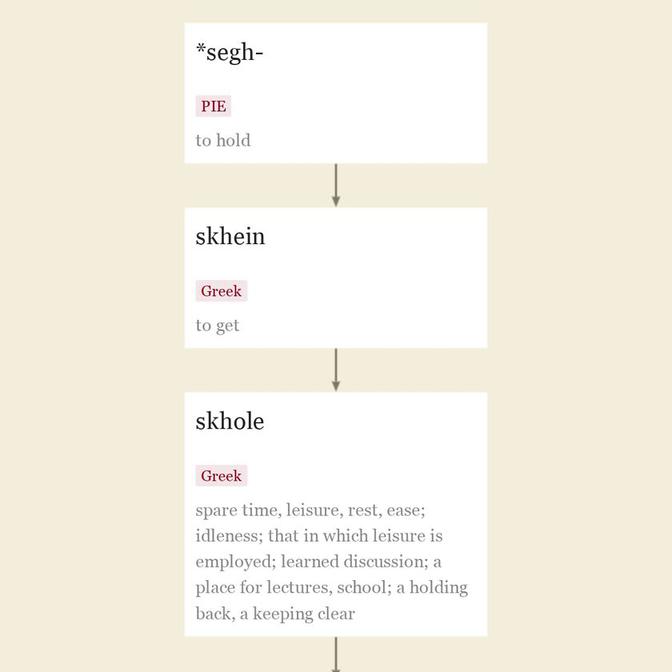Entries linking to homeschool
Old English ham "dwelling place, house, abode, fixed residence; estate; village; region, country," from Proto-Germanic *haimaz "home" (source also of Old Frisian hem "home, village," Old Norse heimr "residence, world," heima "home," Danish hjem, Middle Dutch heem, German heim "home," Gothic haims "village"), from PIE *(t)koimo-, suffixed form of root *tkei- "to settle, dwell, be home." As an adjective from 1550s. The old Germanic sense of "village" is preserved in place names and in hamlet.
'Home' in the full range and feeling of [Modern English] home is a conception that belongs distinctively to the word home and some of its Gmc. cognates and is not covered by any single word in most of the IE languages. [Buck]
Slang phrase make (oneself) at home "become comfortable in a place one does not live" dates from 1892 (at home "at one's ease" is from 1510s). To keep the home fires burning is a song title from 1914. To be nothing to write home about "unremarkable" is from 1907. Home movie is from 1919; home computer is from 1967. Home stretch (1841) is from horse racing (see stretch (n.)). Home economics as a school course first attested 1899; the phrase itself by 1879 (as "household management" is the original literal sense of economy, the phrase is etymologically redundant).
Home as the goal in a sport or game is from 1778. Home base in baseball attested by 1856; home plate by 1867. Home team in sports is from 1869; home field "grounds belonging to the local team" is from 1802 (the 1800 citation in OED 2nd ed. print is a date typo, as it refers to baseball in Spokane Falls). Home-field advantage attested from 1955.
[place of instruction] Middle English scole, from Old English scol, "institution for instruction," from Latin schola "meeting place for teachers and students, place of instruction;" also "learned conversation, debate; lecture; disciples of a teacher, body of followers, sect," also in the older Greek sense of "intermission of work, leisure for learning."
This is from Greek skholē "spare time, leisure, rest, ease; idleness; that in which leisure is employed; learned discussion;" also "a place for lectures, school;" originally "a holding back, a keeping clear," from skhein "to get" (from PIE root *segh- "to hold") + -olē by analogy with bolē "a throw," stolē "outfit," etc.
The basic sense of the Greek word is "leisure," which passed to "otiose discussion" (in Athens or Rome, the favorite or proper use of free time), then it came to be used for the place for such discussion.
The Latin word was widely borrowed (in addition to Old French escole, French école, Spanish escuela, Italian scuola; Old High German scuola, German Schule, Swedish skola, Gaelic sgiol, Welsh ysgol, Russian shkola).
The meaning "students attending a school" in English is attested from c. 1300; the sense of "school building" is by 1590s. Sense of "people united by a general similarity of principles and methods" is from 1610s; hence school of thought (by 1848). As an adjective by mid-18c., "pertaining to or relating to a school or to education."
School of hard knocks "rough experience in life" is by 1870; to tell tales out of school "betray damaging secrets" is from 1540s. School-bus is from 1908. School days is from 1590s. School board "local committee of education" is by 1836; school district "division of a town or city for the management of schools" is by 1809.
Trends of homeschool
More to Explore
updated on September 28, 2017

